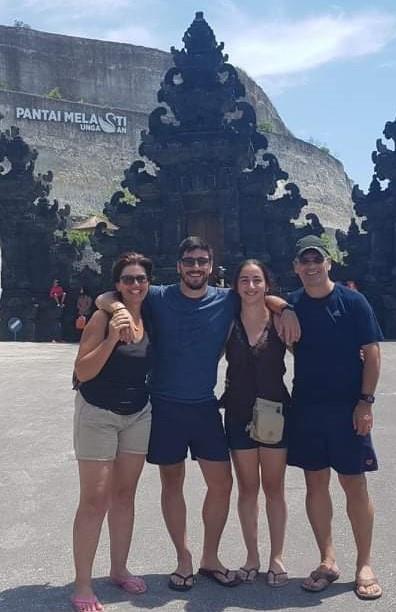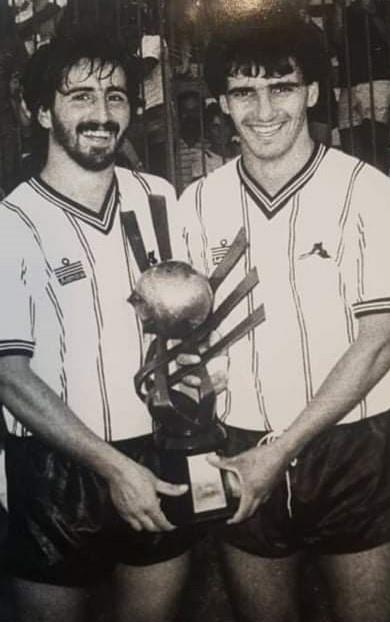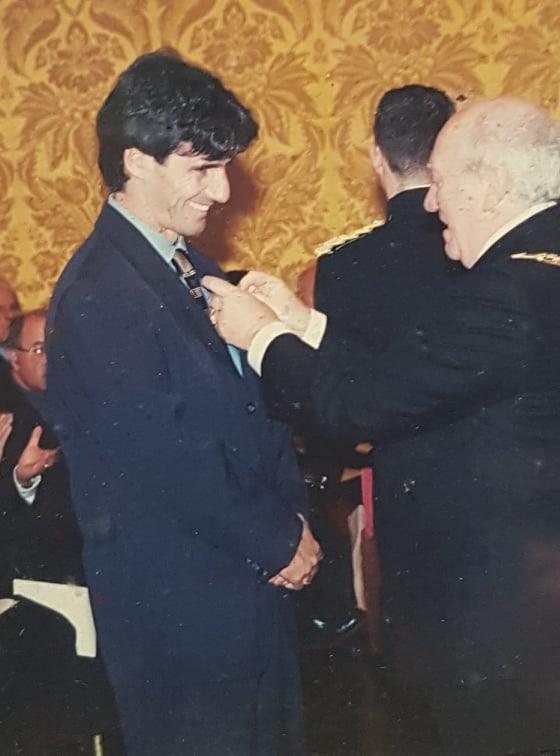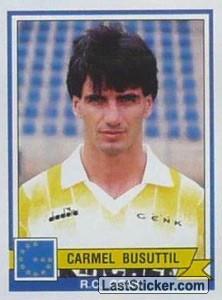Carmel Busuttil was born on 29 February 1964, son of Michael Angelo and Marianne née Vella. He is married to Julia and have two children, Gary 31 and Kelly 29. Gary is an architect and Kelly a PE teacher. Both siblings have followed their parent’s path since they are very active in sports.
But how were the early days for Carmel? “I had a great childhood, playing outdoor in the streets till late in the evening, living in a neighbourhood of five government apartments where we had plenty of space to play. Being the youngest of a family of six, I was always pampered and loved by all my brothers and sister. We were brought up with good family values; we were not given any expensive presents as we come from a middle class family but we had the most important thing; loads of love from our parents, uncles and aunties.”
Carmel attended primary and secondary school before moving on into his first employment, something which he somehow regrets. “Unfortunately, I thought that education and football don’t go together; I was wrong and if I had to turn the clock back I would surely have taken education more seriously and found more time to study and play. I left school at the age of 16 and started working with the Windsor Mattress Company, followed by SGS. During my working years, I felt that this is not what I wanted to do and this helped me to be more determined to achieve what I always dreamt of; being a professional footballer and playing abroad.”

Il-Buzu’s family was practically linked one way or another with football. “Being the youngest of five boys and a girl, I always tried to follow what they were doing, they all played and watched football so I think I got the bug thanks to them. I also believe that talent is born within every person, then it’s up to the individual what he wants to achieve. My brother David also played football and together we won everything that we could win with Rabat Ajax. It was a proud moment to have two brothers playing and another in the committee winning trophies together for our town and in front of thousands of Rabat supporters.”
“It was a dream come true. My eldest brother, John, was in the Rabat committee of those successful Rabat Ajax years and afterwards he became one of the main sports journalists and TV Sports’ presenters. My other brothers, Joseph and Paul, loved football and played with their workmates. They both followed what we were doing. My sister, being four years older than me, always protected me when we had a small argument while playing in the streets and nowadays it’s the other way round, we all protect her.”
But is football the only sport that Carmel was interested in? “My interest began from a very young age because of my brothers but playing outdoors helped me love all kinds of sport. At school I played football, hockey, basketball, table tennis and took part in athletics. I won many medals during my school years as I was very competitive and to be honest still am.”
Il-Bużu started his playing career with Rabat Ajax and was instrumental in making a first for such a small club, winning the League twice. “With Rabat I started playing for the first team at the age of 14, playing in the lower division when we were passing through a very difficult moment. Subsequently Rabat Ajax, a very organised amateur team, took over the Rabat club and from then onwards we started winning promotion after promotion. We made history when we won the first League and we celebrated with thousands of Rabat supporters, an event that I will cherish forever.”

“We had a very strong team with the majority of the players born and bred in Rabat, together with great foreigners and three other players who were not from Rabat. We continued to dominate the domestic league winning all the silverware, the League, the FA Trophy, the Euro Cup and the Super Cup in one season. I also played in the European Champions Cup against Porto FC (then Champions of Europe) and Inter Bratislava. In all I played 139 games with Rabat Ajax and scored 64 goals.”
One cannot meet one of the all-time greatest and not ask him about the individual honours won throughout his illustrious career. “I won the Best MFA Youth Player and Best Player in the 2nd Division, Best Player and Top Scorer for the 1st Division, Malta Footballer of the Year, Best Player by the Association of Sports Writers in Malta, Malta Premier League Top Scorer and European Top Scorer with nine goals scored with the Malta national team in one year. I won this honour finishing at par with Protassov of Russia and Romario of Brazil.”
“There were also other recognitions, such as Gieħ ir-Repubblika, an award given to Maltese citizens for their distinguished service to the country and I was also chosen by the Malta Football Association (MFA) as the Best Maltese Footballer ever during the past 50 years.”
From Malta Carmel decided to progress further by playing abroad with various clubs starting from Verbania and ending in the Belgian League. “At that time playing abroad was very difficult, but I consider myself lucky to have met some great people who helped me out, like Joe Bugeja, Adelmo Paris, Dr Gorg Abela, Dr Joe Mifsud and Horst Heese. to name a few. I am happy with what I have achieved abroad, with Verbania I learnt a lot, my game improved, I became physically and mentally better. In Belgium, playing at top level was difficult at first but I knew and believed a lot in my abilities and with my determination, I won the hearts of the Genk supporters. Being the captain of the team and for three consecutive seasons the top scorer of the team is something that I am proud of. Lately, I was invited twice to give the kick-off of the match and was invited to take part in the new TV documentary about the story of KRC Genk and how it all started. I was also chosen as one of the 20 Golden people of KRC Genk and featured in their latest book.”

Though playing with a club is the main focus of a player, Il-Bużu was synonymous with the national team making his debut in 1982 scoring 23 goals in 113 appearances. What does the national team mean to him? “The national team meant a lot, playing for 22 years from the age of 16. I played for the first time with the Under 18, under the guidance of Johnny Calleja and then moved to the senior team under the guidance of Victor Scerri, who took a great risk to put me in the game at the age of 18, in my first game against Iceland were we won 2-1, a game which was played in Messina. I couldn’t believe that I was part of this winning team! That was a moment to be very proud of!”
“With the help of players like John Holland, Mario Schembri and Leli Fabri they made me integrate with the group. Wearing that red shirt for 113 times made me so proud and that was what really hurt me the most when Norman Darmanin Demajo as president and the MFA suspended me and John Buttigieg for life like criminals because the MFA didn’t pay what they owed us. After they sacked us from national team coaches, which is normal if the team is not performing, they didn’t pay us what was due, nearly four months without pay. After we consulted our lawyer we decided to send them a letter via the Maltese courts. We were paid the full amount the day after and suspended for life because we broke one of the MFA’s rules!! This is the respect we got after playing and giving our best for 22 years and sharing between us more than 200 games. Once again thanks to Dr Gorg Abela, at that time President of Malta, who intervened and the ban was lifted.”
And what about the best goal scored for club and country and also the most loved matches. “Being chosen from MFA as the Best Maltese Player for the last 50 years is also an honour for me. Scoring goals in football is the most difficult part in a game and that’s why I love each goal I scored; but scoring for Malta against the best defenders in the world gives you the most satisfaction. The game was played differently and I was always marked man-to-man and not like nowadays. I achieved all this thanks to my teammates – I was lucky to have great players playing alongside me, all of them know who they are and I cannot mention them all, but I have to name at least one, Raymond Vella (Mundu) whom I have great respect.”
Busuttil returned to Malta playing with Sliema and eventually retiring. How did it all happen and why Sliema? “I wanted to come back to Malta, my wife Julie wanted to stay in Belgium but Genk was relegated and the new coach who was coming was not of my liking so I told my wife that I cannot stay there anymore. My son Gary was also my concern; at that time he was nearly seven and I didn’t want us to confuse his education. I also wanted to enjoy my parents because they were getting old. I chose Sliema because of Martin Gregory, he convinced me to join them. Martin and I were very close, played for the national team and worked together at SGS. I decided to retire after winning the FA Trophy and the Super Cup. At the time I was 38 years old and felt that something is missing. I started leaving my football boots dirty after each game, which for me was not normal. I was supposed to be happy but I was not; I then eventually spoke to my wife that it is time to call it a day; retiring at the top with two honours was the best thing to do.”

Earlier we mentioned the medal for services rendered to the Republic of Malta. How do you rate this recognition by the state? “It was another great honour to receive this medal; this was not only for me but for all the players and coaches that I played with; without them I wouldn’t be here talking about my success. But my biggest recognition is the respect I have from the people in the streets, who still stop me to talk about a particular game which they were present or had seen on TV.”
There are particular moments that Carmel will never forget and which send shivers down his spine. “Winning titles for Rabat and Sliema – with Rabat because we made history and with Sliema to be part of the history of one of the greatest clubs on the island. Scoring for Malta for example against Germany with 35,000 supporters, the roar of the GOAL will always be encrypted in my mind; I still remember that I felt like jumping into the supporters.”
On retiring Busuttil turned his focus on coaching and thus remained part of the game. “During my playing days I was already doing my coaching licences so I knew that I will continue in football, but to be honest at first I really missed the dressing room and my teammates. I started the Buzu Football School, where I wanted to pass my experiences to these young kids. I managed to get on board the likes of John Buttigieg, Paul Zammit, Joe Brincat and J. J. Aquilina, to name a few and we started to take the most talented six/seven-year-olds. We were the first football school and then others started to follow, but none was as successful as we were. Nearly all the kids who attended the Buzu Football School continued playing in the First Division or in the Premier league, some also made it with the national team like Luke Montebello, Ryan Camenzuli, Jurgen Degabriele, Ayrton Azzopardi, Rowen Muscat, Bjorn Kristensen, Shaun Dimech and Aiden Friggieri.”
“I had to close the school because I accepted to be assistant coach to John Buttgieg with the national team. Later I opened the Kick Football Academy where even here we already had some great talent that we will surely hear about them in the coming years. Even here I managed to get some of the best coaches on the island, like Mark Miller and John Buttgieg.”
But why is it that Bużu prefers to keep away from coaching at club level. “To be honest when I see how some of the Maltese clubs are still run and managed, I have no regrets that I prefer to train and develop young children. Children fill me with enthusiasm and I love every training session that I do. I have the patience with them but not with arrogant adults who only think of their ego. It annoys me when administrators think, because they have money, they understand football and I see players posting a photo of themselves after losing and having a bad game and writing some stupid comments like it wasn’t their fault. Just shut up and work harder in your next game. Then there are also other problems, like players not being paid, the apartments’ rent not paid and the landlord wants to kick the player out – this is the situation of some clubs; I don’t want to be part of this. I had this experience and it’s not nice when a foreign player tells you that he was not paid for the last three months – just tell me how can you motivate him?”
And what about the future of football in Malta? Is the MFA doing enough? “Unfortunately we have been saying the some words for the last 20/30 years. Depends what you understand with future; how can we talk about the future when some Premier league teams don’t even have an Academy, their coach has no licence, players still don’t receive their wages but still clubs manage to make transfers? We are in 2021 and some clubs still hire pitches to train and after one-and-a-half hours must go out. Clubs don’t have any daily income but still get 10 or more foreign players. We need people who first must love the game of football and I stop here. I rather and better not comment about the MFA.”
You also mentioned the clubs. What is the main problem with them? “Some clubs are organised but the majority are still run by voluntary persons and on an amateur basis. Some think only short-term and try for immediate success. Abroad clubs become companies, they have different departments, have professional people and they have a strategy, a vision, where they can make more income. Here it’s the president of each club who forks out the biggest part of the salaries and small sponsorships. Winning the league is the biggest sponsor by getting money from the UEFA (supposedly travelling money), but here we use it as a bonus or sponsorship. Abroad they have all the TV rights, all the income from the supporters, they have restaurants and all the bars belong to the club.”
And the present national team? “Lately we did quite well against the lower nations; we played some good football but to compare we must see against the big nations and remember where we stand in our ratings. A big credit must go to all involved like the Premier League coaches, Devis Manga and Silvio Vella, who with his young Under 21 squad managed to get 11 points from a difficult preliminary group, a feat which was never reached by any other coach.”
Turning onto a more personal aspect, what importance does your family have in your life? “My family is everything, they are my priority and last year in December we went all to Bali where I had the best holiday of my life. I never pushed my children to achieve anything, just gave them advice to follow their dreams, to never give up and to work hard.”
And what does Bużu like to eat most? “I love all food except hot/chili food. My favourite is pasta, meat and fish.”
Apart from living abroad, Carmel has also travelled a lot during his entire career. Which is the country that he likes most? “Italy, because we can travel with our car, take our bikes, it is not far away and food is great. I also loved Bali and wouldn’t mind living there.”
Now that Carmel has more free time on his hands, what does he prefer to do most? “I love gardening, reading and cycling.”
Il-Bużu didn’t want to leave before sending one final message which is food for thought. “First my advice is to the parents; don’t push your kids in any sport that you, as a parent, wanted to do. If your kid is not performing and is substituted don’t take it against his coach, talk to your son to work harder. A good coach knows all the kids and he is always right. From a very young age, I never told my parents to talk to the coach and when I didn’t play I said to myself next time I work harder. Talent only is not enough – attitude, determination, sacrifices and a great will is the secret for success.”